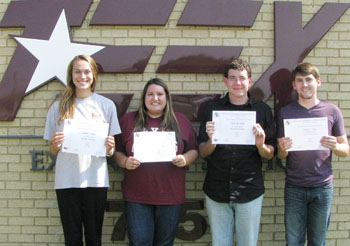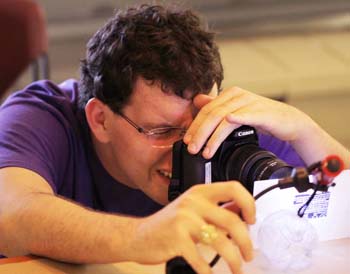The Forensic and Investigative program and the Texas A&M Engineering Extension Service would like to extend their congratulations to four students that received their Forensic Technician certificates in May.
Seniors Sunday Saenz, Tyler Smith, Neil Higgs and Caitlin Evers received the certificates after completing both the required Latent Print Processing and Crime Scene Investigation techniques workshops offered by TEEX’s Texas Forensic Science Academy.

Four students received their Forensic Technician certifications in May during the Latent Print Processing course at Riverside Campus. Pictured from left to right are: Caitlin Evers, Sunday Saenz, Tyler Smith, and Neil Higgs. Photo submitted by TEEX.

Tyler Smith setting up his camera to photograph a fingerprint found on a label. Photo by Rob Williams.
Led by TFSA Coordinator Christine Ramirez, the courses are cross-listed in the Texas A&M catalog as FIVS 421 and 422 under the Forensic and Investigative Sciences Program. Students can earn 2 credit hours for each course. To earn the Forensic Technician certificate, students must complete both the 40-hour Crime Scene Investigation and 40- hour Latent Print Processing courses.
The training is part of the Texas Forensic Science Academy, a collaboration between Texas A&M’s Forensic and Investigative Sciences Program and TEEX as a way of training law enforcement professionals and non-commissioned personnel responsible for either processing and investigating crime scenes or handling evidence used in preparing criminal cases.
The courses provide participants with information, techniques, and methodologies for conducting crime scene investigations and processing crime scene evidence. Completion of this certification is equivalent to completion of the FSA106 – Crime Scene Investigation and FSA104 – Latent Print Processing courses.
Students in the Latent Print Processing course learned different basic techniques for processing latent fingerprints and enhancing visible prints from crime scenes. They also received instruction in taking and processing prints from physical evidence collected from the scene. The crime scene investigation course covers such topics as crime scene searches, scene documentation and proper evidence handling.
“I thought the class was great and loved learning the hands-on activities,” Higgs said. Higgs plans on attending dental school after graduation.
“This was a great class. The instruction has been awesome and I felt like all the information was current and relevant,” said Hannah Beckerdite, a senior Forensic and Investigative Sciences major.
The Forensic and Investigative Sciences degree program at Texas A&M prepares students for careers that involve the collection, preservation, processing and use of evidence and information to solve problems. These careers include law, medicine, homeland security, public safety, political science, environmental quality, agriculture, public health, chemistry, anthropology, physics, computer science and business.
The Department of Entomology enjoys its partnership with TEEX’s Texas Forensic Science Academy. This partnership between faculty and students of TAMU’s Forensic and Investigative Sciences program and experts from TEEX’s Forensic Science Academy will strengthen the curriculum at Texas A&M and offer students an opportunity to participate in cutting-edge technologies and current field methods.